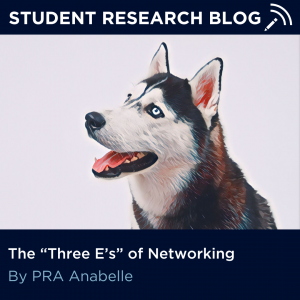By Anabelle Bergstrom, Peer Research Ambassador
 You’ve probably been told hundreds of times how important it is to maintain positive connections with others. Whether it be your academic, social, or professional life, there are always events you can attend that help you meet others with similar aspirations. Getting to a venue on time isn’t too hard to do. What happens when you get there? Who do you talk to if you don’t know anyone? These are all normal questions that may be in your mind as you begin to learn how to network.
You’ve probably been told hundreds of times how important it is to maintain positive connections with others. Whether it be your academic, social, or professional life, there are always events you can attend that help you meet others with similar aspirations. Getting to a venue on time isn’t too hard to do. What happens when you get there? Who do you talk to if you don’t know anyone? These are all normal questions that may be in your mind as you begin to learn how to network.
I have come to enjoy attending networking events with others who have similar goals or experiences to myself. Last spring, I attended the New England Political Science Association’s annual conference to present my Holster Scholar project. Being one of the only undergraduates in attendance, I was nervous that I wouldn’t have anyone to converse with. After a few attempts, I found my own way of conversing with professors and students alike. Since then, I have grown much more comfortable networking at most events. I was not born with networking skills. Instead, I have pushed myself out of my comfort zone to practice. Not only have I gotten better at networking, but I have also built a strong support system around me which has given me new professional opportunities. Without starting a conversation with others, I may not have some of the positions I do now.
Networking is not always easy. Events with large attendance, new faces, and new places are nerve-wracking for anyone. It is in these moments that having a few go-to tips can be helpful in navigating the world of networking. Here are my “three Es” for making successful connections and building your network:
- Engagement- One of the most effective things you can do at networking events is to remain engaged with those you speak with. While in conversation, don’t be preoccupied with trying to figure out what to say next. Instead, trying really listening to what others have to say. Be engaged with them by asking questions about their previous work experience or a related anecdote. This shows that you are an attentive listener and a seasoned conversationalist even if you don’t feel that you are.
- Eye Contact– While at networking events, it is key to maintain eye contact with individuals you speak with. Not only does show another level of engagement, but it also shows that you are genuinely interested in what others have to share. Even if you find yourself in the most boring conversation about niche research methods (we’ve all been there), try to remain as connected as possible. Maintaining eye contact is always a good idea and can benefit the way others see you (no pun intended).
- Enthusiasm– Share your excitement for your passions and share in the excitement of the other people’s interests. Attending networking events that are for others with a similar background to yourself can be a great way to practice this. If you are interested in the same field, ask others about why they are pursuing law, for example. Then, share your “why” as well. This is a simple prompt to see the passion for your field in others and share something you are comfortable with. It is also a great way to bring up other areas you are passionate about to keep the conversation going.
The biggest thing you can do to build these skills is practice. Through practice, you’ll find other skills that help you portray yourself in the best light possible while also getting to know others. The tips outlined above work for me. That doesn’t mean they work for you, which is another reason why practice is important. Networking is one of the most important life skills you will acquire. Whether it be for your career or otherwise, making meaningful connections will open doors for you that you may otherwise never come across.
Anabelle is a junior majoring in Political Science and Philosophy. Click here to learn more about Anabelle.